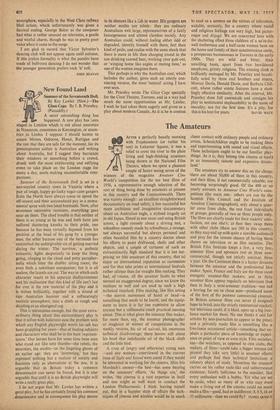New Found Land
Summer of the Seventeenth Doll. By Ray Lawler. (New.)—The Glass Cage. By J. B. Priestley. (Piccadilly.) A MOST astonishing thing has happened. A new play has 'oeen staged in London which is not about neurotics in Nuneaton, countesses in Kensington, or eccen- trics in Limbo. I suppose I should hasten to assure Messrs. Osborne, Home, Rattigan and the rest that they are safe for the moment, for its presumptuous author is Australian and writing about Australia, but I suggest they barricade their windows or something before a crowd, drunk with the most exhilarating and edifying event to take place on the London stage for many a day, starts making uncomfortable com- parisons.
Summer of the Seventeenth Doll is set in a sun-sozzled country town in Victoria where a pair of tough, happy-go-lucky sugar-cane gangers from the North have always come to spend the off-season and their accumulated pay in a monu- mental spree with two local barmaids. Now, after seventeen successive summers, everything goes sour on them. The chief trouble is that neither of them is as young as he was and both have just suffered shattering knocks to their pride, one because he has been virtually deposed from his position at the head of his gang by a younger man, the other because one of the barmaids has committed the unforgivable sin of getting married during the winter. The survivor, a pathetic romantic, fights desperately to keep the thing going, clinging to the ritual and petty parapher- nalia which litter the shabby sitting room; she even finds a substitute companion; but it is all useless; the laurels are cut. The way in which each character reacts to his separate disillusionment and his realisation that this kind of life can't last for ever, is the raw material of the play and it is woven brilliantly, together with a strand of ripe Australian humour and a suffocatingly realistic atmosphere, into a cloth as rough and dazzling as an aboriginal rug.
This is miraculous enough, but the most extra- ordinary thing about this extraordinary play is that it solves with ludicrous ease the problem with which any English playwright worth his salt has been grappling for years—that of finding subjects and characters who shall be in the least 'represen- tative.' Our heroes have for some lime been men who stand out like sore thumbs—the rebels, the neurotics, the misfits—or the lingering ghosts of an earlier age: they are 'interesting,' but they represent nothing but a malaise of society and fascinate only as aberrations at the zoo. It is arguable that in Britain today a common denominator can never be found, but it is also arguable that until it is no British playwright will write a really great play.
I do not argue that Mr. Lawler has written a great play, but he has certainly found his common denominator and in consequence his play moves
in its element like a fah in water. His gangers are neither misfits nor rebels : they are ordinary Australians writ large, representatives of a fairly homogeneous and almost classless society. Any Australian could, without feeling either odd or degraded, identify himself with them, feel their kind of pride, and realise with the same shock that there is more in life than charging round in the sun drinking canned beer, working your guts out, or 'winging home like eagles at mating time,' as one of the women imagines them.
This perhaps is why the Australian cast, which includes the author, gives such an utterly con- vincing version, the most 'natural' acting I have ever seen.
Mr. Priestley wrote The Glass Cage specially for the Crest Theatre, Toronto, and in a way had much the same opportunities as Mr. Lawler. I wish he had taken them eagerly and given us a play about modern Canada. As it is he is content to read us a sermon on the virtues of toleration, suitable, certainly, for a country where racial and religious feelings run very high, but pictur- esque and &gage. We are concerned here with the shattering effect three children of a ne'er-do- well timberman and a half-caste woman have on the home and family of their sanctimonious uncle, a prosperous businessman in Toronto in the early 1900s. They are wild and bitter, their unwilling hosts, apart from two bewildered neophytes, grimly religious. The ensuing clash is brilliantly managed by Mr. Priestley and beauti- fully acted by three real brothers and sisters, Murray Davis, Donald Davis, and Barbara Chil- cott, whose rather exotic features have a start- lingly effective similarity. After the interval, Mr. Priestley dons full canonicals and consigns his play to sentimental implausibility in the name of morality, not for the first time. It's a pity, for


































 Previous page
Previous page